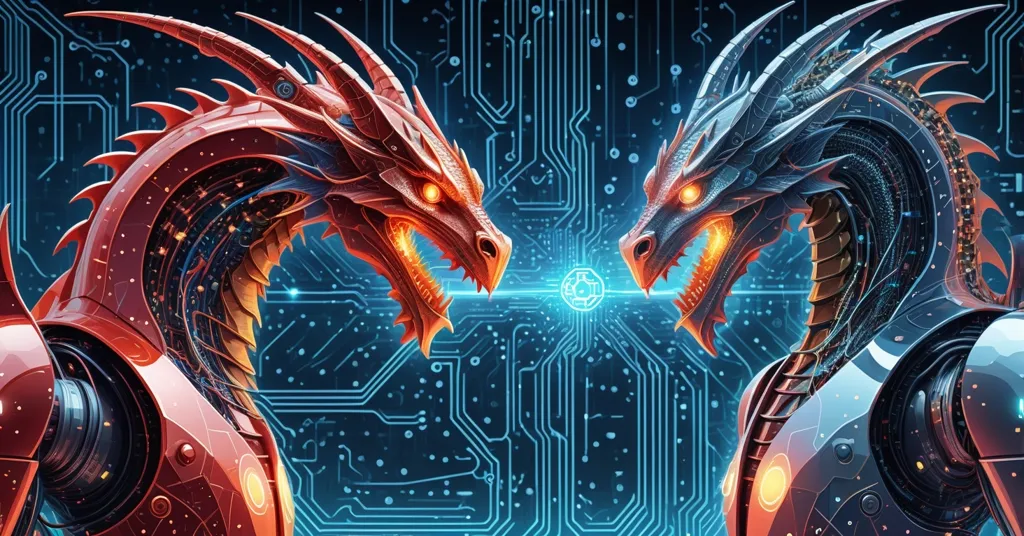China Slams Nvidia H20 AI Chips in US Tech War After Lutnick’s Insult

China Rejects Nvidia H20 AI Chips Amid US-China Tech War After Lutnick’s Remarks
China has launched a bold offensive against Nvidia, urging its tech giants to abandon the company’s H20 AI chips in response to a stinging comment from US Commerce Secretary Howard Lutnick. This escalating spat isn’t just a petty grudge—it’s a flashpoint in the broader US-China tech war, with Beijing pushing hard for domestic alternatives while navigating the messy realities of performance gaps and supply constraints. Let’s unpack this high-stakes clash and what it means for innovation, sovereignty, and even the decentralized tech space.
- China’s regulators push firms like Alibaba to ditch Nvidia H20 chips after US official’s insult.
- Domestic chips from Huawei and Cambricon promoted despite lagging performance.
- US-China tech tensions fuel Beijing’s aggressive drive for self-reliance.
- Potential ripple effects on crypto mining and blockchain infrastructure loom.
China’s Retaliation: A Jab Turns Into Policy
The spark came in July when Howard Lutnick, speaking on CNBC, tossed a rhetorical Molotov cocktail at China’s technological ambitions. His dismissive tone cut deep, framing China as unworthy of America’s top-tier innovations. Chinese officials didn’t take kindly to the slight, viewing it as a direct attack on their national dignity and a reminder of their dependency on foreign tech. In swift response, a coalition of China’s regulatory bodies—including the Cyberspace Administration of China (CAC), Ministry of Industry and Information Technology (MIIT), and National Development and Reform Commission (NDRC)—issued informal yet sharp directives to major players like Alibaba and ByteDance. The order? Stop snapping up Nvidia’s H20 AI chips and pivot to homegrown options.
“We don’t sell them our best stuff, not our second-best stuff, not even our third-best.” – Howard Lutnick, US Commerce Secretary
Lutnick’s words weren’t just a soundbite—they were a catalyst. A source close to Beijing policymakers noted that this gave regulators “one more reason to intensify efforts to push tech firms to use China’s own chips,” as detailed in a recent report on China’s turn against Nvidia’s chips. For context, the H20 chips are a stripped-down version of Nvidia’s cutting-edge AI hardware, crafted to comply with strict US export bans while still serving China’s voracious appetite for artificial intelligence tech. Think of AI inference—where models make real-time decisions, like powering facial recognition or smart assistants—as a key battleground. Until recently, demand for H20 chips was so fierce that Nvidia ramped up production at Taiwan Semiconductor Manufacturing Company (TSMC) to meet orders. But now, that pipeline is under threat as China doubles down on sovereignty.
This isn’t a one-off tantrum. It’s part of a decades-long saga, rooted in initiatives like “Made in China 2025,” aimed at shedding reliance on Western tech. Past moves against US firms like Micron and Intel show a pattern—Beijing wields national security as both shield and sword to curb foreign influence. Yet, beneath the bravado, there’s a cultural sting. Imagine being a Chinese tech worker, grinding to compete globally, only to hear your nation’s efforts belittled as third-rate, a sentiment echoed in Lutnick’s controversial comments on China’s tech policy. That’s the kind of fuel driving this policy shift, even if it means short-term pain for companies forced to adapt.
Nvidia’s Tightrope: Caught Between Markets and Mandates
For Nvidia, this isn’t just a slap on the wrist—it’s a full-blown crisis. The H20 chips were a lifeline to maintain market share in China despite US restrictions, with hundreds of thousands of units ordered to power AI advancements. Now, firms like Alibaba, the e-commerce behemoth, and ByteDance, the brain behind TikTok, have either paused or slashed their H20 purchases. Some are playing a waiting game, holding out for a rumored China-specific version of Nvidia’s next-gen Blackwell series, expected to offer better performance even under export limits. But Beijing isn’t waiting for anyone. Domestic alternatives from Huawei and Cambricon are being aggressively marketed as replacements, especially for AI inference tasks, despite clear performance shortfalls.
Adding insult to injury, the CAC has floated wild claims that Nvidia chips might harbor location tracking or remote shutdown features—allegations Nvidia vehemently denies as pure fiction, as covered in a report on China’s security concerns over H20 chips. Whether true or not, these accusations tap into a long-standing narrative of distrust toward US tech, further eroding Nvidia’s standing. Meanwhile, CEO Jensen Huang recently launched what some call a “charm offensive” in China, praising local AI strides in a bid to salvage relationships. Good luck sweet-talking a dragon, Jensen. On top of that, China’s State Administration for Market Regulation is probing Nvidia over antitrust concerns tied to its Mellanox Technologies acquisition. Talk about a perfect storm—Nvidia’s not just losing sales; it’s risking a broader market collapse in one of the world’s biggest tech arenas.
Financially, the stakes are massive. China accounts for a significant chunk of Nvidia’s revenue, even with restricted product lines. A sustained pullback could dent stock valuations and force a rethink of R&D priorities. For a company synonymous with AI dominance, being sidelined by geopolitics is a bitter irony. And let’s be real—Huawei’s chips aren’t winning speed races anytime soon. Benchmarks, though scarce, suggest domestic options lag in raw processing power and efficiency, critical for cutting-edge AI, as discussed in a comparison of Huawei chips versus Nvidia H20 performance. This gap could stall China’s progress in fields like autonomous vehicles or smart cities, where split-second computation is everything.
US Policy Impact: A Game of Restrictions and Rumors
Zooming out, this clash is a microcosm of the broader US-China tech war. Since the first Trump administration, Washington has clamped down on semiconductor exports, aiming to throttle China’s access to advanced tech. The Biden era kept the screws tight, and now, with Trump back in the mix, murmurs suggest a possible softening. Reports indicate he might greenlight exports of lesser Blackwell or H20 variants to China, despite hawkish calls for even harsher curbs, a topic explored on forums discussing the impact of this tech war on Nvidia. It’s a geopolitical chess match—balancing trade interests against national security fears, all while tech giants like Nvidia get caught in the crossfire.
“As a matter of principle, science, technology, and economic and trade issues should not be politicised, instrumentalised, or weaponised. Containment and suppression will not hold back China’s development.” – China’s Foreign Ministry
The Foreign Ministry’s defiance speaks volumes. China frames US restrictions as futile attempts to stifle inevitable progress, echoing a narrative of resilience. But history tells a different story. Look at Huawei’s 2019 blacklisting by the US—it kneecapped a global leader overnight, exposing the real bite of export bans. Lutnick’s rhetoric, while crude, reflects a deeper truth: the US holds significant leverage in high-end tech, and China’s still playing catch-up. Whether Trump eases restrictions or not, the cycle of retaliation continues, with each side digging in deeper, a sentiment captured in a full transcript of Lutnick’s remarks on Nvidia chips and China.
Crypto and Blockchain Ripple Effects: An Unexpected Angle
Now, let’s pivot to a angle closer to home for our audience—how does this tech standoff impact the world of crypto and decentralized systems? At first glance, AI chips and Bitcoin might seem worlds apart, but dig deeper, and the connections are stark. Nvidia’s GPUs, including lines like the H20, have long been workhorses for cryptocurrency mining, especially in the pre-merge days of Ethereum when Proof-of-Work demanded raw computational grunt. Even today, specialized AI hardware powers blockchain projects integrating machine learning—think decentralized AI networks like Fetch.ai or Ocean Protocol, where inference tasks underpin data marketplaces.
China’s push for domestic chips, if successful, could reshape this landscape. If local alternatives underperform, mining operations or blockchain infrastructure projects within China might face efficiency hits. Imagine slower transaction validations or delayed rollouts of AI-driven smart contracts—small lags that compound in a hyper-competitive space. Analyst Charlie Chai from 86Research notes Beijing’s stance might be more symbolic than absolute, given the lack of viable substitutes, a perspective shared in online discussions about the US-China tech war’s effect on Nvidia. But even a partial shift could nudge miners and developers toward other regions. This might redistribute global hash rates, potentially weakening China’s historic dominance in Bitcoin mining post-2021 ban.
There’s a flip side, though. A forced pivot to domestic tech could spur unexpected innovation in blockchain applications tailored to less powerful hardware, mirroring the resourcefulness seen in early Bitcoin days. And let’s not forget the ethos of decentralization—China’s state-driven push for tech sovereignty, while far from the grassroots rebellion of crypto, shares a kernel of wanting to break free from external control. Yet, state mandates are a clumsy cousin to the borderless freedom Bitcoin embodies. For maximalists, this saga might reinforce why BTC’s simplicity and neutrality trump tech entangled in geopolitical quagmires. Altcoins and hybrid protocols may innovate in AI-blockchain niches, but Bitcoin remains a bastion untouched by chip wars.
Analysis and Counterpoints: Sovereignty vs. Isolation
Stepping back, China’s gamble on domestic chips is a double-edged sword. On one hand, it’s a powerful stand against perceived US arrogance, potentially fostering long-term innovation. Imagine a world where Huawei or Cambricon cracks the AI code, disrupting Nvidia’s monopoly in a way that echoes crypto’s challenge to fiat systems. Analyst Tilly Zhang from Gavekal Dragonomics argues Nvidia chips are now “dispensable” for China, even a bargaining chip in negotiations, a view supported by updates on China’s domestic AI chip production efforts. That’s optimistic, and it aligns with the disruptive spirit we champion—breaking centralized dominance through sheer grit.
But here’s the harsh counterpoint: isolation carries risks. Cutting off Nvidia could tank China’s global competitiveness in AI faster than it builds domestic strength. Supply shortages loom large—new production lines won’t hit until next year at earliest, per industry reports. For every step forward in sovereignty, there’s a potential stumble in progress. This tension mirrors debates in our space—does hyper-independence in tech or finance (like Bitcoin’s ethos) sometimes leave you outpaced by interconnected systems? And unlike crypto’s organic rebellion, China’s top-down approach reeks of control, not freedom. The real question is whether this is a calculated risk or a nationalist bluff that could stall innovation—decentralized or otherwise.
Key Questions and Takeaways
- What triggered China’s rejection of Nvidia H20 AI chips?
US Commerce Secretary Howard Lutnick’s dismissive remark about withholding top-tier tech from China was seen as an insult, spurring regulators to discourage purchases and push domestic alternatives. - How are Chinese tech giants like Alibaba responding?
Many, including Alibaba and ByteDance, have paused or cut H20 orders, with some delaying for potential China-specific Blackwell chips offering better performance under export rules. - What challenges do domestic chips like Huawei’s face?
Significant performance gaps and supply shortages hinder immediate adoption, though new production capacity expected next year might ease constraints. - How does this tie into the US-China tech war?
It’s the latest salvo in a long-running conflict, with US export bans and China’s self-reliance policies clashing over dominance in AI and semiconductors. - Could this impact Bitcoin mining or blockchain projects?
Yes, less efficient domestic chips might slow mining operations or AI-blockchain integrations in China, potentially shifting global hash rates or innovation hubs elsewhere. - Is China’s push for tech sovereignty sustainable?
It’s a bold move with long-term potential to disrupt monopolies, but risks short-term setbacks in competitiveness due to tech gaps and isolationist tendencies. - What’s the broader lesson for decentralized tech?
While China’s fight for independence echoes crypto’s anti-centralization ethos, state control contrasts sharply with the borderless freedom of Bitcoin, highlighting different paths to disruption.
This showdown over Nvidia’s H20 chips isn’t merely a corporate or geopolitical spat—it’s a window into the future of power and innovation. China’s betting big on self-reliance, even if it means stumbling now to stand taller later. For those of us rooting for decentralization, there’s a weird symmetry in watching a nation try to unshackle itself from tech overlords, even if the methods couldn’t be further from Bitcoin’s anarchist streak. The tech war is heating up, and its fallout—whether in AI, semiconductors, or the crypto mines—will shape the battle for freedom and control in ways we’re only beginning to grasp. Stay sharp; the game’s far from over.



